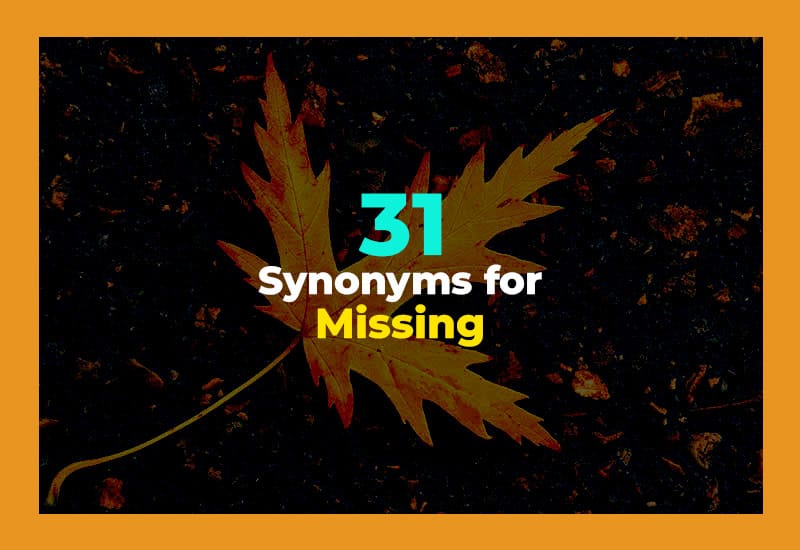You know that feeling when something or someone is just not there? It can be a bit frustrating or even sad. But guess what? There are many cool ways to say "missing." Whether you're talking about a lost sock, a friend who isn't around, or something gone from your life, you'll find the perfect word here. Let's dive into 31 easy and fun synonyms for missing, each explained clearly with examples you can use every day!
1. Absent
When someone or something is absent, it means they are not present where they should be. For example, if your friend is absent from school, they did not come to class that day. Sometimes, a meeting can be absent of important people, meaning those people are missing from it. You might say, "The teacher was absent yesterday, so we had no class." It is a polite and simple way to say that someone or something is not there, without making it sound too serious.
2. Lost
The word lost means something that cannot be found. Like when you lose your keys or your phone, you don't know where they are. For example, "I lost my wallet on the bus." It can also mean feeling confused or not knowing what to do, like "I feel lost without my best friend." When you use lost, it shows that something or someone is gone in a way that you want to find them again.
3. Gone
Gone means that someone or something has left or disappeared. For example, "My dog is gone; I can't find him anywhere." It is a simple word that tells us something is no longer here. Sometimes, it can feel sad, like when a person is gone forever, but it can also just mean they are not here right now, like "She's gone to the store." It's easy to use when you want to say something isn't where it should be.
4. Missing
The word missing is used when something or someone is expected to be there but is not. For example, "My jacket is missing from the closet." Or if a friend did not show up, you could say, "He is missing from the party." It means you are looking for it or them. Police often say "missing person" when they can't find someone. It is the most common word to talk about things or people that are not where they should be.
5. Abandoned
When something is abandoned, it means it was left behind or forgotten. For example, "The old house was abandoned after the family moved away." It can sound a little sad because the thing or person was left alone. You might also say, "The puppy was abandoned in the park." It means no one is taking care of it anymore, and it's just left there. This word shows a stronger idea of missing, like being lost and left by choice.
6. Vanished
Vanished means that something disappeared suddenly and completely. For example, "The magician made the rabbit vanish from the hat." Or, "The cookies on the plate have vanished." It feels like the thing is gone without a trace. It is often used in stories or mystery to make things sound more exciting or strange. If you say something has vanished, it means it is really missing and you do not know where it went.
7. Forgotten
If something is forgotten, it means no one remembers it or it was left behind because people didn't think about it. For example, "I forgotten my homework on the table." Or, "That birthday is forgotten by everyone." It shows that something or someone is missing because people are not paying attention or don't remember it anymore. This word can be sad because it means the missing thing was ignored or not cared for.
8. Out
The word out can mean something is not inside or missing from where it should be. For example, "The milk is out in the fridge," meaning it is gone or finished. Or, "She is out of the room now." It is a simple and short word to say something or someone is missing from a place. You can use it when talking about people or things that have left or disappeared.
9. Not Found
When something is not found, it means you looked for it but couldn't see or get it. For example, "My phone was not found after searching the whole house." It's a clear way to say something is missing. This phrase is often used in reports or when explaining a search. It doesn't sound too sad or serious, just a fact that something is missing right now.
10. Lost Track
If you lost track of something or someone, it means you no longer know where they are or what happened to them. For example, "I lost track of time while playing games." Or, "We lost track of our friend at the concert." It shows you were trying to keep an eye on it, but now it is missing or unknown. It is often used in daily life when things or people go missing briefly or by accident.
11. AWOL
AWOL means "Absent Without Leave." It is used when someone leaves a place without permission, often in the army or work. For example, "The soldier went AWOL last week." Or, "He was AWOL from work yesterday." It is a formal way to say someone is missing when they should be there. It sounds serious and is used when the missing person did not tell anyone they were leaving.
12. Unaccounted For
If someone or something is unaccounted for, it means nobody knows where they are or what happened to them. For example, "Three passengers are still unaccounted for after the boat trip." Or, "Several items are unaccounted for after the move." It is a polite and formal way to say missing, often used in reports or news. It shows uncertainty about the location or condition of people or things.
13. Lost Without a Trace
When something is lost without a trace, it means it disappeared completely with no signs left behind. For example, "The keys are lost without a trace after the party." Or, "The hiker was lost without a trace in the forest." This phrase makes the missing thing sound mysterious and impossible to find. It is often used in stories or serious situations when the thing or person is very hard to locate.
14. Misplaced
If you misplaced something, it means you put it somewhere wrong and now can't find it. For example, "I misplaced my glasses this morning." Or, "The documents were misplaced on the desk." It means the item is missing, but probably nearby and will be found soon. This word shows that the missing thing is lost by mistake, not gone forever.
15. Skipped
If someone skipped a place or event, it means they missed it on purpose or by accident. For example, "He skipped class today." Or, "She skipped breakfast this morning." It means missing something but with a reason, like choice or accident. It is often used when talking about people missing activities or appointments.
16. Absent Without Leave
This means the same as AWOL. It means someone is missing where they are supposed to be, without telling anyone. For example, "The student was absent without leave from school." It is a formal way to say someone is missing without permission. This phrase is serious and shows someone did not follow rules by being missing.
17. Nowhere to Be Found
When something or someone is nowhere to be found, it means they cannot be located anywhere. For example, "My book is nowhere to be found." Or, "The cat was nowhere to be found all day." It means the missing thing is lost very well and you can't find it at all. It is a casual and clear way to show something is truly missing.
18. Absent-Minded
If someone is absent-minded, it means they forget things often or don't pay attention. For example, "She is absent-minded and often loses her keys." It doesn't mean something is missing itself, but it causes things to go missing. It's a fun way to describe people who forget or miss things because their mind is somewhere else.
19. Skipped Out
To skip out means to leave a place quickly, often to avoid something. For example, "He skipped out of work early." Or, "She skipped out on the meeting." It means someone is missing by leaving without telling. It sounds casual and a bit sneaky. It's used when people miss something by choice and don't want to be noticed.
20. Lost Cause
A lost cause means something or someone that is missing and very unlikely to return or be fixed. For example, "Trying to fix that old car is a lost cause." Or, "The idea was a lost cause from the start." It is not used for simple missing things but for situations or things that are missing forever or cannot be recovered.
21. Off
If something or someone is off, it means they are missing or not available where expected. For example, "He is off sick today." Or, "The lights are off, so no one is home." It's a short and easy way to say something is missing or not present.
22. AWOL
AWOL means "Absent Without Leave." It is used when someone leaves a place without permission, often in the army or work. For example, "The soldier went AWOL last week." Or, "He was AWOL from work yesterday." It is a formal way to say someone is missing when they should be there. It sounds serious and is used when the missing person did not tell anyone they were leaving.
23. Missing in Action
This phrase is often used in the military when a soldier is missing during battle. For example, "The soldier was reported missing in action." It means the person is lost but may still be alive. Outside the army, it can mean someone is not at a place where they are expected. It's a serious way to say missing with hope of return.
24. Nowhere Near
If something is nowhere near, it means it is far away or missing from where it should be. For example, "The answer is nowhere near correct." Or, "The car is nowhere near here." It shows missing in distance or correctness.
25. Off the Map
If someone or something is off the map, it means they are missing or in a very unknown place. For example, "He went off the map after the trip." Or, "That restaurant is off the map." It means hard to find or missing from usual places.
26. Out of Sight
When something is out of sight, it means you can't see it and it is missing from view. For example, "The ball rolled out of sight." Or, "She hid the gift out of sight." It shows the missing thing is hidden or away from view.
27. Missing Piece
A missing piece means an important part that is not there. For example, "The puzzle has a missing piece." Or, "The story is the missing piece to the mystery." It means something important is missing and needs to be found.
28. Disappeared
If something disappeared, it means it went away suddenly and can't be found. For example, "The magician's coin disappeared." Or, "My socks disappeared in the laundry." It means the missing thing is gone in a quick and mysterious way.
29. Unseen
If something is unseen, it means no one has noticed it or it is missing from view. For example, "The secret was unseen by everyone." Or, "The cat stayed unseen behind the sofa." It shows missing because it cannot be seen or found.
30. Hidden
If something is hidden, it means it is kept out of view and missing from sight. For example, "The treasure was hidden under the tree." Or, "The notes were hidden in the drawer." It means the missing thing is there but not easy to find.
31. Lost and Found
Lost and found is a place where missing things are kept when people find them. For example, "I gave my lost jacket to the lost and found." It means things that were missing can be returned. It is a helpful way to talk about missing things that might come back.

I hope you enjoyed learning all these different ways to say "missing." Now you have many fun and easy words to use when something or someone isn't where they should be. Whether it's something small like a lost sock or a serious missing person, these words can help you explain it better. Keep practicing, and you'll sound like a language pro in no time!









